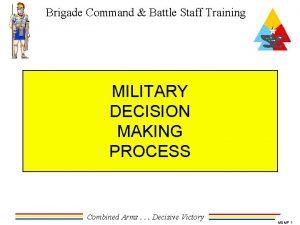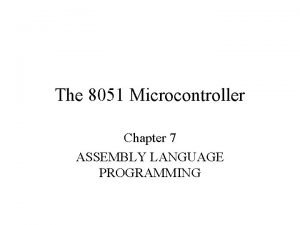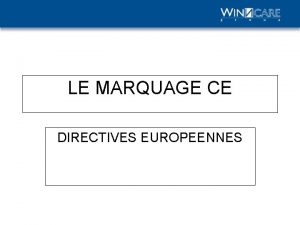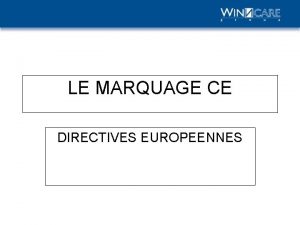ADVANCE DIRECTIVES WHAT ARE ADVANCE DIRECTIVES Advance Directives

















- Slides: 17

ADVANCE DIRECTIVES

WHAT ARE ADVANCE DIRECTIVES • Advance Directives are instructions created by an individual to administer, withhold, or withdraw life-sustaining procedures in the event of a terminal or irreversible condition • These instructions explain the individuals wishes for health care in the event they become incompetent or otherwise mentally/physically incapable of communication • Advance Directives only go into effect when the individual becomes a “qualified patient”. A “qualified patient” means a patient with a terminal or irreversible condition who is incompetent or otherwise mentally/physically incapable of communication • This condition is diagnosed & documented in writing in the medical record by the primary physician

FORMS OF ADVANCE DIRECTIVES • Written Directive (“Living Will”) – Written instructions explaining the individual’s wishes for health care in the event that they become incompetent or incapable of communicating their wishes – Legal document that must be completed when individual is competent to make own health care decisions – Primary physician must be notified that an Advance Directive has been signed

FORMS OF ADVANCE DIRECTIVES (continued) • Non-written Directive – Issued by non-written communication in the presence of the primary physician and 2 witnesses one of which must be a qualified witness – Must be completed when individual is competent to make own health care decisions – Documented in medical record by physician & includes the names of the witnesses

WHAT IS A QUALIFIED WITNESS • A competent adult witness who is not: – Family member – Person designated to be the Medical POA – Primary physician or their employees – An employee of the health care facility that is providing direct patient care, an officer, director, partner or business officer – Anyone who could claim part of individual’s estate

FORMS OF ADVANCE DIRECTIVES (continued) • Out-of-Hospital Do Not Resuscitate ( DNR) Order – Legally binding DNR order using form specified under the Health & Safety Code – Signed by individual’s primary physician – Directs health care professionals in an out-of-hospital setting not to initiate or continue life sustaining treatment – Does not include authorization to withhold medical interventions or therapies considered necessary to alleviate pain, provide water & food and other comfort care measures – Applies to following settings: nursing homes, in-patient hospice facilities, hospital outpatient or emergency departments, physician offices, private homes & transport vehicles (ambulances).

FORMS OF ADVANCE DIRECTIVES Out-of-Hospital Do Not Resuscitate ( DNR) Order (cont) • For inpatient admissions, initiating from the ECC, when the patient presented with an “Out-of-Hospital DNR”, the ECC physician/nurse will confirm with the patient/family and/or the duly authorized representative of the patient what code status they desire. If the patient desires any type of code status other than a full code, the ECC physician will write the appropriate admitting code status order and the nurse responsible for the care of the patient will place the appropriate code status identification bracelet prior to the patient leaving the ECC.

FORMS OF ADVANCE DIRECTIVES (continued) • Medical Power of Attorney (POA) – Document that delegates authority to an agent or agents to make health care decisions for the individual issuing the Medical POA document, should that individual become unable to make those decisions – Medical POA cannot make decisions for that individual until the physician has determined individual unable to make own health care decisions – POA is obligated to follow the wishes of the individual when making decisions on their behalf

Can Advanced Directives Be Revoked? • Advance Directive become invalid if the individual is determined to be pregnant. • Advance directives can be revoked at anytime regardless of individual’s ability to make a competent decision – The individual who signed the Advanced Directive or anyone in that person’s presence, may physically destroy the Directive – The individual may submit a written, signed & dated document revoking the Directive – The individual may verbally communicate intent to revoke Advance Directive • Revocation does not go into effect until physician has been notified of the written or verbal revocation. – Physician must document in medical record the date, time & if oral revocation the place of notification – The word “VOID” must be written on each page of Directive in patients chart

ADVANCE DIRECTIVE A PATIENT RIGHT & TEXAS STATE LAW • In accordance with Texas state law & federal law OBMC patients have the right to receive information concerning Advance Directives • If they have Advance Directives, they have the right to have them honored by physicians & hospital staff • The first step is to determine if the patient has Advance Directives

ADMISSIONS PROCEDURE • Admissions asks all inpatient admissions if they have Advance Directives • A copy of Advance Directives is placed in the chart by admissions, if available at that time • Patients who have an Advanced Directive but did not bring to hospital are advised to do so. • Admissions gives inpatients and observation patients a “PATIENT GUIDE” booklet which includes patient rights and information on Advance Directives. • Patient or designee initials receipt of information on admission form

NURSING UNIT PROCEDURE • Primary nurse is responsible for documenting the status of the patient’s Advance Directive when performing the Admission assessment • Advance Directives are documented under the “Patient Profile” • Click the icon

TO ACCESS ADVANCE DIRECTIVES IN PATIENT PROFILE Click on downward arrow to bring up Advance Directives

DOCUMENTING ADVANCE DIRECTIVES Click on on Pencil Click pencil

CLICK ON “Adv. Directive” (#2), drop down box to bring up types of Advance Directives

DOCUMENT TYPE OF ADVANCE DIRECTIVE (#2) May choose more than one Click “Save” after each choice

ADD NOTES (# 3) Check “Doc in Chart “ when copy placed in chart Add notes to clarify, for example, ” Patient declined information on Advanced Directives” or “Son, John will bring copy of Living Will this afternoon”. It is a Patient Right to have their Advance Directive honored by their physician and hospital staff in accordance with federal & Texas law
 Antigentest åre
Antigentest åre Idph advance directives
Idph advance directives What are the types of advance directives
What are the types of advance directives Advantages and disadvantages of advance directives
Advantages and disadvantages of advance directives What are the types of advance directives
What are the types of advance directives Battlestaff directives (dps.mil)
Battlestaff directives (dps.mil) Compiler control directives in c
Compiler control directives in c Personal directives act
Personal directives act Ptr operator in assembly language
Ptr operator in assembly language Assembler
Assembler Assembler directives of 8051
Assembler directives of 8051 Examples of eu directives
Examples of eu directives Aabe application form
Aabe application form Mike towr
Mike towr Iec directives
Iec directives A simple sic assembler in system software
A simple sic assembler in system software Ce directives
Ce directives What are jsp directives
What are jsp directives




























